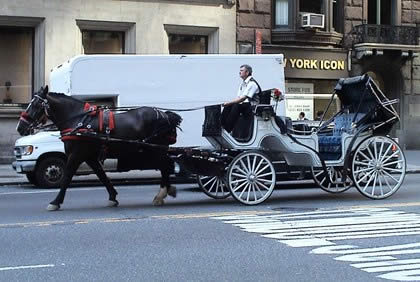
Horseytalk.net Special Interview
Horse carriage owners and operators
Horse carriage owners and operators fight to preserve their way of life
 While a high-profile ordinance that would ban the use of horse-drawn carriages in New York City has not yet reached the city council, the proposed legislation has drawn criticism from carriage operators as well as from a veterinarian who believes such a ban is not necessarily in the horses' best interest.
While a high-profile ordinance that would ban the use of horse-drawn carriages in New York City has not yet reached the city council, the proposed legislation has drawn criticism from carriage operators as well as from a veterinarian who believes such a ban is not necessarily in the horses' best interest.
Last year, Allie Feldman, executive director of New Yorkers for Clean, Livable, and Safe Streets (NYCLASS), called for a citywide ban on horse-drawn carriages on grounds that the carriages were inhumane. At that time, she said 16 members of the New York City council would support an ordinance that would replace horse-drawn cabs with electric vintage replica cars. In January, newly-elected New York City Mayor Bill DeBlasio said he would back any legislation that would ban the operation of horse-drawn carriages in the city. However, Feldman said that, so far, no legislation has reached the members of the New York City council.
“We haven't introduced a bill and we haven't even named a sponsor yet," said Feldman.
Meanwhile, horse carriage owners and operators oppose such legislation on grounds that their industry is already heavily regulated, and their horses are well-protected under a current law. Stephen Malone, spokesman for the Horse and Carriage Association of New York and a 30-year owner/operator of horse-drawn carriages in the city, said an ordinance passed in 2010 gives carriage horses at least five weeks of vacation each year, bigger stalls, and quality veterinary and farrier care.
“This industry is regulated enough,” Malone said.
At the same time, Malone said the proposed ordinance would force him to relinquish his horses in order to make sure the animals never work again.
“These horses are not just business assets to me, they are my business partners,” Malone said.
The lack of work is just one reason why veterinarian Sarah Ralston, VMD, PhD, Dipl. ACVN, a professor in the Rutgers University Department of Animal Sciences, opposes legislation that would take these horses from their owners and force them into permanent retirement on yet unspecified farms. Ralston said regular work and a set routine helps to keeps horses healthy and enhances the animals' quality of life.
"The carriage horses, on the whole, are showing no signs of distress or unwillingness to work when asked to do so," asserted Ralston. "They are well adapted to their environment. If they weren't, they would not last long on the streets."
More importantly, Ralston said, such legislation sets a dangerous precedent for horses as well as for the humans who look after them.
“If a horse is in its stall without access to pasture, but is getting quality basic care and regular exercise, should we say that this horse is being abused, or is it cruel to ask a horse to do a job that it is well-trained for and capable of doing without distress?” Ralston said. “This is the norm for a majority of the horses kept in urban and suburban settings, and this (kind of legislation) sends a terrible precedent that should have the entire horse industry up in arms.”
Meanwhile, Feldman declined to comment on whether NYCLASS will talk with horse-drawn carriage operators and others about what the proposed ordinance should contain.
“All I can say is that we intend to make sure our ordinance is fair and equitable to all parties,” Feldman said.
While New York City's proposed ordinance is being prepared, lawmakers in Philadelphia, Pa.; Salt Lake City, Utah; and Chicago, Ill., are re-examining their own rules governing horse-drawn carriages.
In Philadelphia, Mark McDonald, press secretary to Mayor Michael Nutter, said the city has no current plans to ban horse carriages there. Instead, a working group is reviewing regulations already on the city’s books.
“The (working group) will focus on licensing and enforcement of our (regulations) regarding carriage horses and the stables that house them,” he said.
In Salt Lake City, City Council Chairman Charlie Luke said council members voted to support an amendment to the city's existing ordinance on Feb. 4. In part, the amendment regulates the ages of carriage horses, authorizes random drug testing of drivers, and requires carriage companies to educate the public about the carriage trade and how carriage horses are cared for. Luke also said the ordinance puts under contract the company that provides horse-drawn carriages in Salt Lake City.
“The contract gives us more leverage to regulate the industry,” Luke said.
Finally in Chicago, Donal Quinlan, press secretary to Ald. Ed Burke, said Burke introduced legislation on Feb. 5 that would cease the city's issue of new horse-drawn carriage licenses until all such licenses have expired. That ordinance, which is backed by Mayor Rham Emanuel, remains pending in the Chicago city council.




